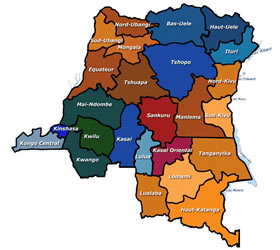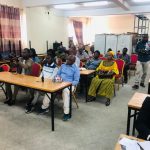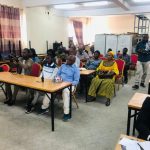Illégitimité des acteurs locaux, cause du sous-développement des entités territoriales décentralisées (ETD) Cas de la province du Kwilu

MULOPO GIHANI GHICHARD*
*Licencié en droit, assistant de deuxième mandat à l’Université de Bandundu et chercheur au CRUB
https://doi.org/10.59937/EWII2885
Résumé
La République Démocratique du Congo est l’un des pays du continent qui a connu une instabilité politique et institutionnelle à cause notamment du problème de la crise de légitimité. Pour aboutir à des résultats de nos recherches, quelques textes des lois relatifs à la décentralisation nous ont servi de canevas pour atteindre des résultats escomptés. La légitimité politique repose évidement sur l’action populaire mesurée par les suffrages. Dans un Etat de démocratie représentative comme la République Démocratique du Congo, les élections sont un fondement de tout pouvoir. Car, elles donnent un sens de respect des valeurs démocratiques telles que : la liberté d’expression dans le choix des dirigeants, la liberté de sanction en cas d’inaction et de médiocrité dans l’action du dirigeant. Les suffrages populaires octroient à l’acteur politique une efficacité sans concurrent, et permet d’établir un lien direct entre d’une part, l’acteur politique (élu), et d’autre part la population (électeur). Le vrai problème auquel se heurte cette décentralisation, est cet aspect de la double légitimité. Laquelle met en mal la fonctionnalité des entités décentralisées. Le parrainage politique, le clientélisme ainsi que des récompenses politiques sont des causes d’inefficacité des acteurs en fonction depuis l’installation du processus de décentralisation. Il s’avère très important d’arriver à un déclic de légitimité pour le développement de la République Démocratique du Congo en général.
Mots clés : Décentralisation, légitimité, Démocratie
Abstract
The Democratic Republic of Congo is one of the countries on the continent that has experienced political and institutional instability, notably because of the problem of the legitimacy crisis. In order to reach the results of our research, some texts of the laws related to decentralization served as a framework to achieve the expected results. Political legitimacy is obviously based on popular action measured by votes. In a state of representative democracy such as the Democratic Republic of Congo, elections are a foundation of all power. For, they give a sense of respect for democratic values such as: freedom of expression in the choice of leaders, freedom of sanction in case of inaction and mediocrity in the action of the leader. The popular vote gives the political actor an unrivalled efficiency, and makes it possible to establish a direct link between the political actor (elected) on the one hand, and the population (voter) on the other. The real problem with this decentralization is this aspect of dual legitimacy. This undermines the functionality of decentralized entities. Political sponsorship, clientelism and political rewards are the causes of inefficiency of the actors in office since the installation of the decentralization process. It is very important to reach a legitimacy trigger for the development of the Democratic Republic of Congo in general.
Keywords: Decentralization, legitimacy, democracy






















































